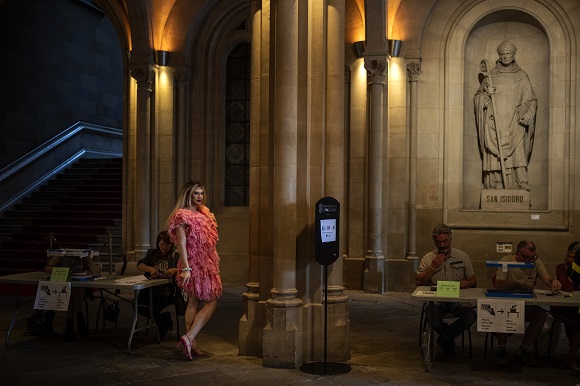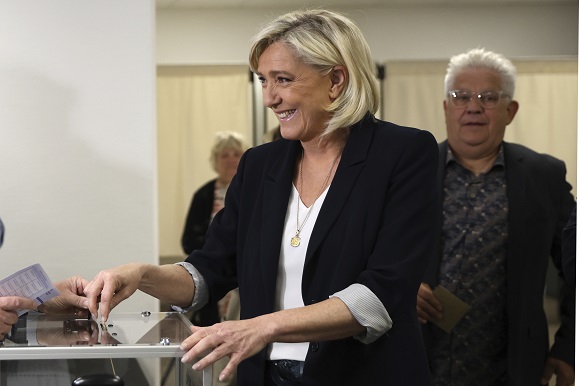By Raf Casert, Lorne Cook and Samuel Petrequin Associated Press headline news online news
Brussels (AP) — Voting has ended to elect the European Union’s regional lawmakers for the next five-year term after the last remaining polls closed in Italy, as surging far-right parties dealt a body blow to two of the bloc’s most important leaders: French President Emmanuel Macron and German Chancellor Olaf Scholz.
Official results were expected any moment after Italian polling stations closed at 11 p.m. local time (2100GMT), officially ending a marathon election spanning four days across 27 bloc member countries.
An initial projection provided by the European Union indicated far-right parties have made big gains at the European Parliament.
In France, the National Rally party of Marine Le Pen dominated the polls to such an extent that Macron immediately dissolved the national parliament and called for new elections, a massive political risk since his party could suffer more losses, hobbling the rest of his presidential term that ends in 2027.
Le Pen was delighted to accept the challenge. “We’re ready to turn the country around, ready to defend the interests of the French, ready to put an end to mass immigration,” she said, echoing the rallying cry of so many far-right leaders in other countries who were celebrating substantial wins.
Macron acknowledged the thud of defeat. “I’ve heard your message, your concerns, and I won’t leave them unanswered,” he said, adding that calling a snap election only underscored his democratic credentials.
headline news online news
In Germany, the most populous nation in the 27-member bloc, projections indicated that the AfD overcame a string of scandals involving its top candidate to rise to 16.5%, up from 11% in 2019. In comparison, the combined result for the three parties in the German governing coalition barely topped 30%.
Scholz suffered such an ignominious fate that his long-established Social Democratic party fell behind the extreme-right Alternative for Germany, which surged into second place. “After all the prophecies of doom, after the barrage of the last few weeks, we are the second strongest force,” a jubilant AfD leader Alice Weidel said.
The four-day polls in the 27 EU countries were the world’s second-biggest exercise in democracy, behind India’s recent election. At the end, the rise of the far right was even more stunning than many analysts predicted.
The French National Rally crystalized it as it stood at over 30% or about twice as much as Macron’s pro-European centrist Renew party that is projected to reach around 15%.
Overall across the EU, two mainstream and pro-European groups, the Christian Democrats and the Socialists, remained the dominant forces. The gains of the far right came at the expense of the Greens, who were expected to lose about 20 seats and fall back to sixth position in the legislature. Macron’s pro-business Renew group also lost big.
For decades, the European Union, which has its roots in the defeat of Nazi Germany and fascist Italy, confined the hard right to the political fringes. With its strong showing in these elections, the far right could now become a major player in policies ranging from migration to security and climate.
headline news online news
Bucking the trend was former EU leader and current Polish Prime Minister Donald Tusk, who overcame Law and Justice, the national conservative party that governed Poland from 2015-23 and drove it ever further to the right. A poll showed Tusk’s party won with 38%, compared to 34% for his bitter nemesis.
“Of these large, ambitious countries, of the EU leaders, Poland has shown that democracy, honesty and Europe triumph here,” Tusk told his supporters. “I am so moved.”
He declared, “We showed that we are a light of hope for Europe.”
Germany, traditionally a stronghold for environmentalists, exemplified the humbling of the Greens, who were predicted to fall from 20% to 12%. With further losses expected in France and elsewhere, the defeat of the Greens could well have an impact on the EU’s overall climate change policies, still the most progressive across the globe.
The center-right Christian Democratic bloc of EU Commission President Ursula von der Leyen, which already weakened its green credentials ahead of the polls, dominated in Germany with almost 30%, easily beating Scholz’s Social Democrats, who fell to 14%, even behind the AfD.
“What you have already set as a trend is all the better – strongest force, stable, in difficult times and by a distance,” von der Leyen told her German supporters by video link from Brussels.
As well as France, the hard right, which focused its campaign on migration and crime, was expected to make significant gains in Italy, where Premier Giorgia Meloni was tipped to consolidate her power.
headline news online news
Voting continued in Italy until late in the evening and many of the 27 member states have not yet released any projections. Nonetheless, data already published confirmed earlier predictions: the elections will shift the bloc to the right and redirect its future. That could make it harder for the EU to pass legislation, and decision-making could at times be paralyzed in the world’s biggest trading bloc.
EU lawmakers, who serve a five-year term in the 720-seat Parliament, have a say in issues from financial rules to climate and agriculture policy. They approve the EU budget, which bankrolls priorities including infrastructure projects, farm subsidies and aid delivered to Ukraine. And they hold a veto over appointments to the powerful EU commission.
These elections come at a testing time for voter confidence in a bloc of some 450 million people. Over the last five years, the EU has been shaken by the coronavirus pandemic, an economic slump and an energy crisis fueled by the biggest land conflict in Europe since the Second World War. But political campaigning often focuses on issues of concern in individual countries rather than on broader European interests.

Since the last EU election in 2019, populist or far-right parties now lead governments in three nations — Hungary, Slovakia and Italy — and are part of ruling coalitions in others including Sweden, Finland and, soon, the Netherlands. Polls give the populists an advantage in France, Belgium, Austria and Italy.
“Right is good,” Hungarian Prime Minister Viktor Orbán, who leads a stridently nationalist and anti-migrant government, told reporters after casting his ballot. “To go right is always good. Go right!”
Associated Press journalists Sylvain Plazy in Brussels and Geir Moulson in Berlin contributed to this report.
headline news online news
Notes from APS Radio News
Three years ago, in the context of vaccine mandates, mask rules, lock-downs and rules of social distancing, almost every weekend cities like Paris, Berlin, Rome and London experiencied outpourings of thousands of people protesting against “covid” policies.
During lock-downs, in a number of countries, the number of suicides and instances of deferred medical care happened.
In the US, by December 2020, over 100,000 small and medium-sized businesses had been shuttered as a result of “covid” policies.
(Please click onto the image of the cat to hear Classical Music0

Reportedly because of what was being called a “pandemic”, a number of the world’s central banks embarked on massive programs of monetary expansion, starting in late February and early March of 2020.
For its part, between the early part of March of 2020 to over a year later, the US Federal Reserve added over $4 trillion to its holdings, by purchasing billions of dollars’ worth of Treasury bonds and corporate bonds each month during that period.
As well, at that time it kept interest rates rather low.
Other central banks, including the Bank of Japan and the European Central Bank, followed similar policies.
In addition, during that period many countries engaged in lockdowns; many small and medium-sized businesses and enterprises were shuttered by way of orders issued by public health officials, politicians and various administrators.
One of the direct causes of those shutdowns was the development of shortages.
According to a number of economists, the combination of shortages of various goods and services and massive programs of “quantitative easing” led to substantially higher rates of inflation.
In consequence of shuttered economies and higher rates of inflation in the first world, less developed countries suffered greatly, due, in part, to shortages of supplies and due to lowered demand.
For some time, in its articles about China, The Wall Street Journal has pointed to “covid” related lockdowns as being one of the major causes of China’s downturn in its economy.
In the US, by October of 2020, over 100,000 businesses had been shuttered by way of lockdowns
By the summer of 2022, the officially reported rates of inflation were those not experienced since 1982.
headline news online news


